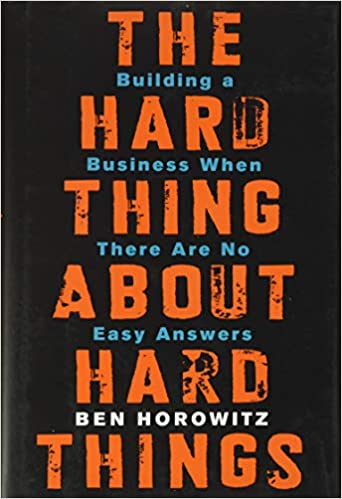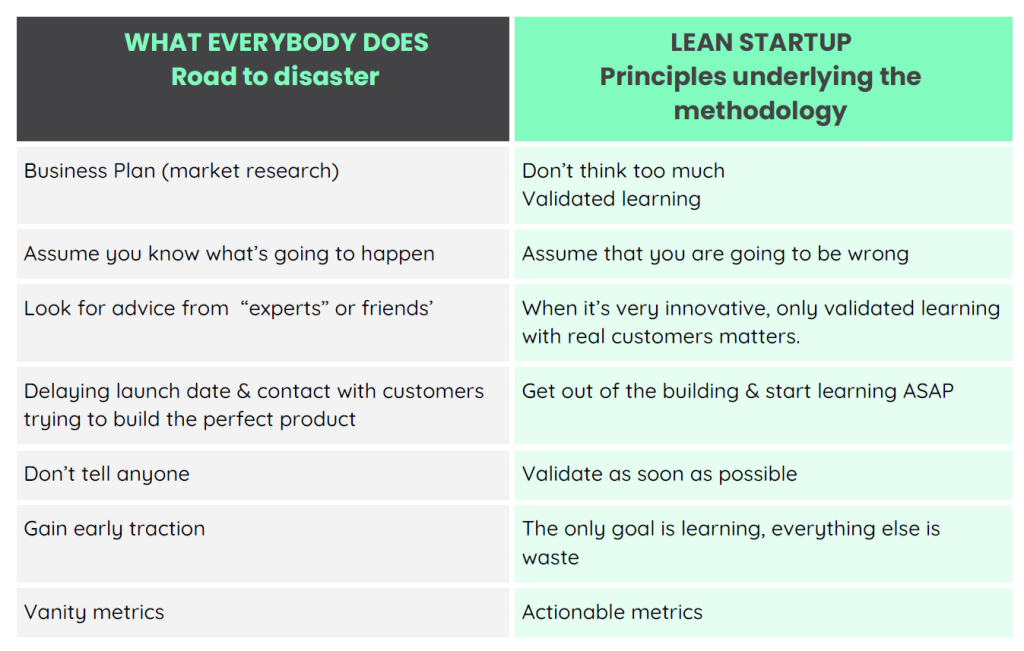In general, a startup founder needs to do many difficult things. It is even more difficult because the founder will probably be doing these difficult things for the first time.
One of the best books about this topic is “The Hard Thing About Hard Things: Building a Business When There Are No Easy Answers”, by Ben Horowitz, co-founder of the venture capital firm Andreessen Horowitz. Below I bring some selected quotes from his book:
“Hard things are hard because there are no easy answers or recipes. They are hard because your emotions are at odds with your logic. They are hard because you don’t know the answer and you cannot ask for help without showing weakness.”
“Startup CEOs should not play the odds. When you are building a company, you must believe there is an answer and you cannot pay attention to your odds of finding it. You just have to find it. It matters not whether your chances are nine in ten or one in a thousand; your task is the same.”
“People always ask me, “What’s the secret to being a successful CEO?” Sadly, there is no secret, but if there is one skill that stands out, it’s the ability to focus and make the best move when there are no good moves.”
As I said in a previous post, I believe that the most effective approach to succeed is to avoid the basic mistakes that are being made by most entrepreneurs. Below I present a list of such common mistakes in the “road to disaster”, which was the topic of a very interesting class I had at ThePowerMBA, based on the work of Eric Ries, author of “The Lean Startup”.
Typical Mistake 1: Excessive Planning
Most startup founders spend a considerable time working on a detailed Business Plan (BP). This BP includes, among other things, the conclusions of market research, competitive analysis and financial projections, both for the future expenses and the expected revenues.
The main problem is when founders spend too much time thinking and doing all kinds of analyses instead of validating their product. Indeed, by preparing the BP the entrepreneurs may be learning about the market and about the competition, but this is not useful to validate their product nor to validate their business model. In other words, this kind of planning does not help bring the company closer to product-market fit, which should be the main goal for any early-stage startup company.
“Plans are only good intentions unless they immediately degenerate into hard work.” ― Peter Drucker, author and management consultant
Typical Mistake 2: Excessive Confidence and Optimism
Entrepreneurs are natural optimists. It is their optimism and confidence that enables them to face the risk of creating a startup company. People who lack this level of positive thinking about their abilities will not leave the safety of their jobs to start a new business. However, this optimism may be very dangerous when founders assume that they know what’s going to happen.
Of course startup founders should be optimists and should also have confidence in their abilities, but at the same time they should assume that they are going to be wrong. Most founders don’t have much business experience before they create their startup, so they will be attempting many difficult things for the first time. Even if they do have previous experience, if the product is really innovative, they should not make too many assumptions about how the market will react to their product idea.
“Making assumptions simply means believing things are a certain way with little or no evidence that shows you are correct.” ― Daniel Handler, book author
Typical Mistake 3: Expert Advice instead of Customer Validation
Many startup founders, when trying to get feedback for their ideas, look for advice from “experts” or friends. This kind of feedback is easily accessible, and in general helps the entrepreneurs to reinforce their beliefs. The problem is that this advice may also be very misleading, because it is being provided by people who do not have “skin in the game”.
The business experts may be able to provide us with some valuable feedback when their experience is relevant. But when a product is very innovative, only validated learning with real customers matters. Real users, who are paying with their money to buy our product or access our service, have “skin in the game”. Only this kind of validation may bring the company closer to product-market fit.
“Your most unhappy customers are your greatest source of learning.” ― Bill Gates, founder of Microsoft
Typical Mistake 4: Building the Perfect Product
Unfortunately, many startup founders are perfectionists. This is particularly the case of the technical founders, which may consider it unacceptable to deploy a software with some bugs or partial functionality. These founders will delay the launch date, and as a consequence postpone the contact with real customers, trying to build the perfect product.
In contrast, early-stage startup companies should get out of the building stage and start learning as soon as possible. While the software is being implemented there is no one using it to provide us any kind of feedback. At this stage the company has a high burn-rate but very low learning rate. Only validated learning enables the company to make progress towards product-market fit before all the company resources have been burned-out.
“If you are not embarrassed by the first version of your product, you’ve launched too late.” ― Reid Hoffman, founder of LinkedIn
Typical Mistake 5: Keeping a Secret
It is common for startup founders to be afraid to share their ideas with others. They don’t tell anyone about their vision nor the product features because they think that someone will steal their startup idea. They want it to be a secret.
But this fear is prejudicial to the founders. They cannot benefit from keeping a secret. In contrast, the entrepreneurs’ goal should be to validate their ideas as soon as possible. We cannot learn anything from an idea that is not being exposed to the market.
“Ideas are commodity. Execution of them is not.” ― Michael Dell, CEO of Dell
Typical Mistake 6: Premature Focus on Profitability
Some startup founders focus too early on gaining traction. This means that they try as early as possible to make their startup profitable and to start growing without additional investments. In other words, they try to bootstrap their company.
However, for an early-stage startup, the only goal is learning, and everything else is waste. It is extremely risky to try to become profitable when the company has not yet made a real effort to get closer to product-market fit. An early-stage startup could easily consume all its resources trying to sell a product that is not ready to be sold.
“In the business world, everyone is paid in two coins: cash and experience. Take the experience first; the cash will come later.” ― Harold S. Geneen, ex-president of ITT Corporation
Typical Mistake 7: Focus on Vanity Metrics
Very frequently we observe that early-stage startup companies focus on Vanity Metrics. This kind of metrics includes the number of user logins, number of app downloads and number of likes on social networks. They are not indicative of product-market fit because we can increase each one of these metrics by simply increasing our marketing spend.
In contrast, startup founders should focus on Actionable Metrics. Examples of these metrics are the Conversion Rate, the Customer Acquisition Cost (CAC) and the Customer Life-Time Value (CLTV). If we are able to improve the Conversion Rate, reduce the CAC or increase the CLTV, we are getting closer to product-market fit.
“Vanity metrics wreak havoc because they prey on a weakness of the human mind. In my experience, when the numbers go up, people think the improvement was caused by their actions, by whatever they were working on at the time. That is why it’s so common to have a meeting in which marketing thinks the numbers went up because of a new PR or marketing effort and engineering thinks the better numbers are the result of the new features it added. … Actionable metrics are the antidote to this problem. When cause and effect is clearly understood, people are better able to learn from their actions. Human beings are innately talented learners when given a clear and objective assessment.” ― Eric Ries, author of The Lean Startup
In Summary
The table below summarizes the typical mistakes and the correct approaches.
In my future articles I intend to continue sharing what I’ve been learning at ThePowerMBA. Please use the comments below to let me know what would be your main topics of interest.



Pingback: Vamos falar das startups em Israel: como construir uma de sucesso – Portal E21